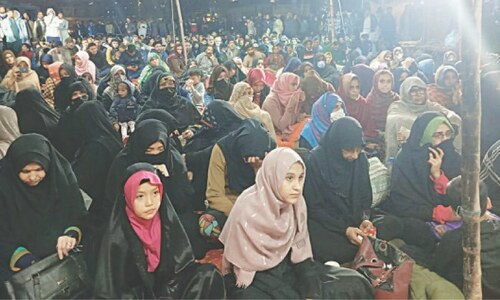KARACHI: How can you have just development when you have a structure that is fundamentally unjust? This was the question that Dr Mwangi wa Githinji tried to find an answer to in his keynote address at a conference organised by Habib University on Saturday.
Dr Githinji, an associate professor of economics at the University of Massachusetts, read out a paper on ‘The impossibility and possibility of a just postcolonial development’. He focused on the idea of development, that is, whether just development was possible. “How can you have just development when you have a structure that is fundamentally unjust?” he said. Drawing from his African experience he said he would look at the idea of development to argue that it’s a kind of ‘deficit model’ in the light of late-late colonisation — Africa was colonised extremely late in the process.
Dr Githinji argued that the standard story of the development of human society was linear. There was an unfolding of history in a predictable manner, which then created a sense of dualities where we ended up with our so-called less developed societies represented by categories such as traditional, oral, agrarian and poor as opposed to modern, written, industrial and rich (that the process of development would lead them to). It attempted to bring Africa into the existing capitalist world in a particularly subservient form. Capitalism itself was a system founded on injustice. “There’s no capital without workers,” he remarked.
Dr Githinji said colonies were useful [for colonisers] as a market and a source for raw material. This was part of the blueprint of capitalist development; England did it, other countries emulated. Germany also felt the need for industrialisation and raw materials.
Capitalism itself is a system founded on injustice
Dr Githinji then highlighted important moments in colonisation where injustice took place and “continues to haunt us”. They included recreating English landscapes in foreign lands; transporting diets; creating private property etc. This led him to talk about the different kinds of ‘dispossession’ that resulted because of the process. The first was dispossession of labour, followed by economic dispossession, dispossessing citizenship and dispossessing history.
Expanding on dispossessing history, he pointed out factors such as rewriting history, creating racial hierarchies, religious control and language. His view on the destruction of language [due to colonisation] struck a chord with the audience, especially the sentence, “Language is the carrier of cultures, library of ideas.”
Dr Githinji in the last part of his presentation touched upon the idea of spherical development — multifaceted with different paths, dealing with issues such as ‘who gets represented’; radical inclusion — creating a just development paradigm; and reimagining the nation.
Postcolonial politics
The first panel discussion after the keynote speech was on ‘Imagining a postcolonial politics’ moderated by Dr Nauman Naqvi. Dr Suren Pillay, associate professor, Centre for Humanities Research, University of Western Cape, presented his paper on ‘Thinking the state from Africa, Teaching the state in Africa’. He said decolonisation in present-day South African universities related more to the question of epistemology. He then spoke about a project that is under way at the University of Western Cape to rethink political theory and political philosophy.
The next speaker was Dr Peter Hallward, professor of Modern European Philosophy at Kingston University, UK. The title of his paper was ‘The will of the people and the weight of the past’. He analysed the words ‘people’ and ‘will’ in relation to the nature of sovereignty.
Replying to a question asked by a member of the audience on how to overcome capitalism, Dr Hallward said we lived in a time where we could formulate such questions. He gave the example of a recent Tory Party conference where the party had to defend the notions of capitalism in a “lame defence of the free market”.
In the post-lunch session, moderated by Dr Asif Farrukhi, the audience heard a moving speech by Dr Minoli Salgado, director of the Centre for Colonial and Postcolonial Studies, University of Sussex.
Referencing the 30 years of violence in Sri Lanka similar to the rest of the region where “law is marked by the suspension of the law”, she wondered for writers “how to find a language overwhelmed by daily reports of violence”. She said all writers were drawn to hidden history. She put forward the query “what is the duty of a writer” and moments later answered, “It is the duty of writers to break silences.” She said it was in that spirit that she wrote a novel, A Little Dust on the Eyes, from which she also read out an excerpt.
The next speaker on the panel was Dr Sabyn Javeri, assistant professor of Arzu Centre for Literature and Languages, Habib University. Her talk was on ‘Teaching feminist fiction in the Pakistani undergrad classroom’.
She said she grew up in Gen Zia’s Pakistan where she didn’t get to read her own literary heritage. She did not read Ismat Chughtai or Rashid Jahan. And when she taught Chughtai’s story The Quilt in her class, the students were surprised to know that it was written before Partition.
The final session of the conference was on ‘Revisiting emancipatory futures’.
Published in Dawn, October 15th, 2017















































Dear visitor, the comments section is undergoing an overhaul and will return soon.